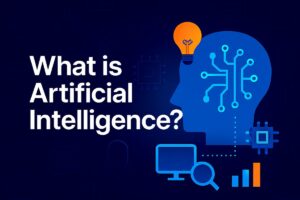The education system in the future is set for radical changes with the integration of advanced technology, AI-driven personalization, global collaboration, and skill-centric curricula. This article explores upcoming trends, challenges, and opportunities that will reshape how students learn and educators teach. Learn how adaptive learning, immersive technologies, and a focus on life skills will define the future of education.
Education has always been a cornerstone of human progress. But as we move deeper into the 21st century, the education system in the future is poised to undergo transformative changes that cater to a rapidly evolving world. Curious readers like you often wonder: What will classrooms look like in 10 or 20 years? Will traditional schools survive? What skills will future generations need to thrive? In this blog, we explore the complete landscape of the education system in the future, addressing your curiosities and concerns with expert insights.
The Driving Forces Behind the Education System in the Future
Several global trends are pushing the evolution of education:
- Technological Advancements: AI, VR, AR, and Big Data
- Globalization: Cross-border education and cultural exchange
- Workforce Changes: Automation, gig economy, and new-age careers
- Student-Centric Approaches: Personalized and adaptive learning
- Sustainability and Equity: Inclusive education for all
Key Features of the Education System in the Future
1. Personalized Learning Powered by AI
Artificial Intelligence will revolutionize how students learn:
- Tailored lesson plans based on individual strengths and weaknesses
- Real-time feedback to students and teachers
- Adaptive assessments that modify difficulty levels dynamically
Benefits:
- Maximizes individual student potential
- Minimizes learning gaps
- Encourages lifelong learning habits
2. Immersive Technologies: VR, AR, and MR
The integration of immersive technologies will redefine classrooms:
- Virtual Reality (VR): Virtual field trips, historical recreations
- Augmented Reality (AR): Interactive science experiments, language learning
- Mixed Reality (MR): Hybrid experiences blending physical and virtual worlds
Real-world Example: Medical students practicing surgeries in virtual operating rooms.
3. Global Classrooms and Cross-Cultural Learning
The education system in the future will become borderless:
- International collaborations via online platforms
- Exchange of cultural ideas and global perspectives
- Remote learning opportunities for underserved regions
Key Tools: Massive Open Online Courses (MOOCs), virtual universities, global credentialing.
4. Shift from Rote Learning to Skill-Based Education
Future education will emphasize:
- Critical thinking
- Problem-solving
- Creativity
- Emotional intelligence
- Entrepreneurial skills
Skill Categories:
| Hard Skills | Soft Skills |
|---|---|
| Coding | Adaptability |
| Data Analysis | Collaboration |
| AI & Robotics | Leadership |
| Cybersecurity | Communication |
5. Lifelong and Continuous Learning
Unlike the current model of early-life education, the education system in the future will support ongoing learning:
- Micro-credentials
- Online certifications
- Modular degrees
Advantage: Professionals can upskill or reskill anytime during their career.
6. Teacher Roles Evolving into Mentors
Teachers will transform into facilitators:
- Guiding personalized learning paths
- Focusing on emotional and social support
- Collaborating with AI-based teaching assistants
7. Inclusive and Accessible Education for All
Equity will be a core principle:
- Free or low-cost quality education for underserved communities
- Technology-enabled accessibility for students with disabilities
- Gender and cultural inclusivity
Challenges in Implementing the Education System in the Future
While the future sounds promising, there are hurdles to cross:
- Infrastructure Gaps: Especially in rural and underdeveloped regions
- Digital Divide: Unequal access to devices and internet
- Teacher Training: Adapting to new technologies and methodologies
- Privacy Concerns: Data security for students and teachers
- Resistance to Change: Cultural and institutional inertia
Case Study: Finland’s Progressive Education Model
Finland offers a glimpse into the education system in the future:
- No standardized tests until late teens
- Emphasis on play-based learning
- Teacher autonomy and high professional respect
- Integration of technology in a balanced manner
The Finnish model demonstrates how future-ready education fosters creativity, happiness, and excellence.
The Role of Governments and Policy Makers
For the education system in the future to succeed, governments must:
- Invest in infrastructure and digital access
- Update curricula regularly based on industry needs
- Promote public-private partnerships
- Ensure teacher training programs are future-ready
- Develop robust data privacy frameworks
The Role of Parents and Guardians in the Future Education System
Parents will need to:
- Embrace flexible learning models
- Encourage independent thinking and exploration
- Collaborate closely with educators
- Promote digital literacy at home
Traditional vs. Future Education System
| Aspect | Traditional Education | Future Education System |
| Curriculum | Fixed, exam-focused | Flexible, skills-oriented |
| Technology | Minimal | Fully integrated |
| Learning Pace | Uniform for all | Personalized and adaptive |
| Role of Teachers | Instructors | Mentors and facilitators |
| Accessibility | Limited | Global and inclusive |
| Assessment | Standardized exams | Continuous, competency-based |
Top Trends Shaping the Education System in the Future
- AI Tutors & Learning Analytics
- Blockchain for Credential Verification
- Gamification for Enhanced Engagement
- Neuroeducation (Brain-Based Learning)
- Global Collaboration Platforms
- Emphasis on STEAM (Science, Technology, Engineering, Arts, and Mathematics)
- Mental Health Support in Curriculum
FAQs
1. What is the education system in the future?
The education system in the future refers to a dynamic, technology-driven, personalized, and inclusive learning model that prepares students for rapidly changing global needs by focusing on skills, emotional intelligence, and lifelong learning.
2. How will AI impact the education system in the future?
AI will personalize learning paths, provide real-time feedback, automate administrative tasks, and assist teachers in identifying students’ strengths and weaknesses, resulting in more efficient and tailored education.
3. Will traditional schools disappear in the future?
While traditional schools may not disappear entirely, they will evolve to incorporate hybrid models combining physical classrooms with virtual learning environments, offering more flexible and customized education options.
4. What skills will be most important in the education system in the future?
Key skills include critical thinking, creativity, adaptability, emotional intelligence, digital literacy, problem-solving, and interdisciplinary knowledge blending technology with human-centric competencies.
5. How will technology improve accessibility in education?
Technology will bridge geographic and socioeconomic gaps by offering online courses, virtual classrooms, assistive technologies for disabilities, and affordable digital resources accessible from anywhere in the world.
6. What challenges will the education system in the future face?
Challenges include addressing the digital divide, ensuring data privacy, providing adequate teacher training, overcoming resistance to change, and building robust infrastructure in underserved regions.
7. What role will parents play in the future of education?
Parents will act as partners in their children’s learning journeys, supporting independent thinking, promoting digital literacy at home, and collaborating with teachers to ensure holistic development.
8. How will assessments change in the education system in the future?
Assessments will become continuous, competency-based, and adaptive, focusing on real-world problem-solving abilities rather than memorization of facts.
9. Will online education replace traditional schooling completely?
Online education will complement, not replace, traditional schooling by providing additional flexibility and access, especially for remote learners and adult education, while physical schools continue to offer social interaction and experiential learning.
10. How can developing countries adopt the education system in the future?
Developing countries can adopt future education systems by investing in digital infrastructure, training teachers in new methodologies, forming public-private partnerships, and prioritizing inclusive and equitable policies.
Conclusion:
The education system in the future holds immense promise. It has the potential to democratize learning, foster creativity, and prepare students for careers that don’t even exist yet. However, realizing this vision will require collective effort from governments, educators, parents, and the private sector. If we embrace innovation while ensuring inclusivity and ethical safeguards, the future of education can become a powerful engine for global progress.
Have thoughts or questions about the education system in the future? Drop your comments below and join the conversation! Share this post with anyone curious about the exciting changes ahead in education.

